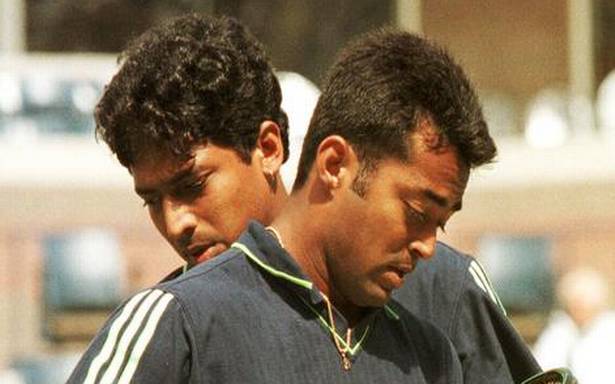Directed by Nitesh Tiwari and Ashwiny Iyer-Tiwari, the web-series showcases the contrasting personalities of both Indian tennis stars, and what brought about their infamous split
The most successful doubles partners in tennis of the 1990s, the Woodies — Australia’s Mark Woodforde and Todd Woodbridge — have often said that a doubles partnership is like a marriage. The partners are bound to go through, in the long-term, all the ups and downs that a husband and wife experience.
Also Read | Get ‘First Day First Show’, our weekly newsletter from the world of cinema, in your inbox. You can subscribe for free here
But watching Break Point, the story of India’s doubles tennis legends Leander Paes and Mahesh Bhupathi, you get the feeling it’s actually not. It’s not a marriage. You don’t even have to be friends or really buddy-buddy to play good doubles together. You just need to get along. Like Rohan Bopanna says in an episode, “Even if they don’t talk, but just play tennis, they can win a gold medal.”
Lack of communication
This talking — or the lack of it — forms the crux of Break Point. It’s a recurring theme; every episode in the seven-part docu-series has either one or both players lamenting on the lack of communication that resulted in the end of a great partnership. As sports writer and journalist Rohit Brijnath observes in the series, “What makes doubles players tick is the communication and trust. And they didn’t have that.”
Break Point is directed by filmmaker duo Nitesh Tiwari and Ashwiny Iyer-Tiwari — creators behind sports dramas like Dangal and Panga — who are co-directing a project for the first time. The contrasting personalities of Paes and Bhupathi is revealed in the way they talk to the camera. It is a reflection of how they were 20 years ago: Paes, fierce and animated; Bhupathi: mellow and reserved. Each is effective in bringing out his side of the story.
The series features the pair’s families, friends, coaches, partners, and journalists who covered their journey during its hey-day. The best insights, however, are offered by their rivals: the Woodies and the Bryan brothers (Bob and Mike Bryan). They talk about the importance of space between doubles partners (Paes and Bhupathi would spend everyday together) and the power of healing (Paes and Bhupathi never let their differences subside.)
Also Read | Leander Paes and Mahesh Bhupathi: On ‘Break Point’ and life coming full circle
Those desperate to find out that one moment which caused the spilt between the ‘Indian Express’ will be sorely disappointed. It was a mixture of several things which ultimately snowballed, ranging from silly (“He did not congratulate me after my win”) to serious (“He was close with her. Very close.”)
But what could be surprising and revealing is how early the disagreements started to crop up, how they won most of their Grand Slams after they stopped talking to each other. “It was our worst year in terms of communication, but our best year in terms of performance,” Paes says of 1999 when they made it to the finals of all four Majors and won the French Open and Wimbledon.
Unfortunately, Break Point also offers little to nothing about Paes and Bhupathi’s triumph at the Davis Cup; they hold the record of winning 24 consecutive doubles matches. Few sporting contests can be more thrilling than a crucial Davis Cup doubles rubber. Unfortunately, this was traded out for the glamour of the Grand Slams.
The joy of doubles tennis
Break Point is more about the story and less about the storytelling. After watching talking heads for seven episodes, a rousing, dramatic climax feels out of place, however familiar the visual looks.
The highlight across episodes is, of course, the tennis. It is not like Senna, which was compiled and edited from thousands of hours of Formula One footage. Break Point has wrung out whatever little tennis archival material the makers could get their hands on (sometimes overutilised, with footage repeating over several episodes). It reminded us that, at their best, the two Indians were a joy to watch, with their intuitive understanding of each other’s moves.
If any part demands a rewatch, it is the episode where Paes and Bhupathi deconstruct their win over Goran Ivanisevic and Jeff Tarango in the 1999 French Open final. They explain their tactics, their mental disposition; all details that journalists and fans at the time would salivate to know.
Break Point also reinforces what a joy it is to watch doubles tennis in general. If you are not familiar with the rules, you can’t keep up with the mind-boggling speed of developments during a doubles match, and may find yourself struggling to comprehend some tense moments in the series. Doubles gets treated like the sport’s neglected step-child, but it really is excellent theatre where everything is more colourful, complicated… maybe even more captivating. Just like Lee-Hesh.
Break Point is currently streaming on ZEE5
Source: Read Full Article

